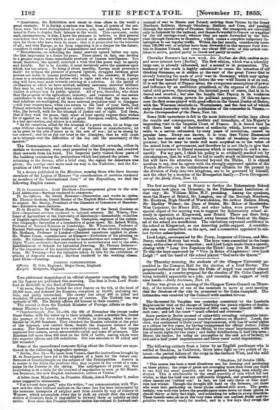Two additional despatches of an offidaIcharactex rupeeg thiellattle on the
Ingour are published-thi&morning. The first is from Lord Sirat- ford de Redcliffe to the.Earl of Olarendom
"At,noon-, Omar Pasha forded the river Ingour on the 6th, at the head of 20,000 men, and defeated the Russians, computed at 10,000, including mi- litia, and partly intrenched. The enemy lost about 400 - hr killed and wounded, 60 prisoners, and three pieces of canton. The Turkish loss was-
meWards of 300. The British officers honourto their country." The second is from the Turkish Minister of Foreign Affairs to the OV. tbmart Minister in London:
"Constantinople, Nov. 16.—On the. 6th of November -the troops under Omar-Pasha, with- the water up to their armpits,- under a terriblefire, forced+ the passage of the river Anakara, or Onflour' in Georgia, which was' dee• fended by 16,000 Russians. They attacked, the Russian redoubts at the point of the' bayonet, and carried them, despite the desperate defence of this enemy. The Russian troops were completely routed, and fled. Our troops captured--five cannon, seven' ammunition-carts;. and some 40 prisoners. The Russians-left more than 400 dead on the field of battle, among whom were two superior officers and100 subalterns. Our loss amounts to 68 killed- and 220 wounded." -
Some of the unconfirmed rumours flying- about the Continent are men. tioned in the following telegraphic message.
" Berlin, Nov. 16.—We learn from Vienna,. that the instructions brought by M. de Bourqueney have led to the adoption, of a basis- for the future con- ferences at Constantinople on- the subject of the Principalities. Austria is toresign to the Allies the positions they may require in the event of a cam-. paign on the Danube in the spring. The anticipators of peace say, that everything is' in a -train for the renewal of negotiation as soon as Sir Hamil- ton Seymour, the new English Ambassador, arrives at Vienna."
A letter from Myslowitz, in Prussian Silesia, dated November 8, makes some suggestive statements. "For several days past," says the writer, "our communication with War- saw and the other.railroad stations on the same line has been interruptedly the immense transports of sulphur sent from Austria by way of Cracow to Warsaw, which accumulate every day to' such an extent' that the railway station at Granitza Ends it impossible to forward them as quickly as they arrive. Ever since this Prussian frontier station has-refused to-forward con- traband of war to Russia and Poland, arriving from Vienna by the Great Northern Railway, through Odenberg, Ratibor, and Cone, and passing: :through the narrow strip of Prussian territory, the transports are conveyed; portly-to Leipniek by the railroad, and thence forwarded to Cracow on waggons ;by the old carriage-road; whence they are again forwarded by the rail- road through Czakowa to Granitza ; which causes a complete temporary in- terruption to our regular traffic. Within the last month, considerably more than 100,000 cwt. of sulphur have been forwarded in- this manner from Aus- tria to Russian Poland, and every. day about 600- ewts. of this article-con- 'tinue to arrive, packed partly in chests and partly in easks."


































 Previous page
Previous page